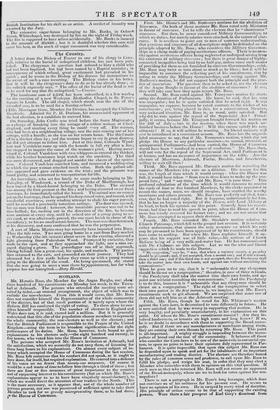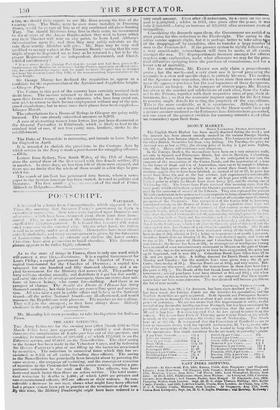SCOTLAND.
Mr. Horatio Ross, the Member for the Angus Burghs, met elbow three hundred of his constituents on Monday last week, in the Town- hall at Arbroath. The persons who attended the meeting were ad- mitted bp ticket,--an unusual arrangement, the object of which was to exclude the non-electors. From this it would seem, that Mr. Ross does not consider himself the Representative of the whole community of the district, but of that small portion of it merely upon whom the Reform Bill has conferred the right of voting. To them alone he con- siders himself responsible. The number of electors in England and Wales does not, it is said, exceed half a million. But it is generally understood that this elite of the population choose members to represent the whole community, the non-electors as well as the electors • and that the British Parliament is responsible to the People of the United Kingdom—using the term in its broadest signification—for the right performance of its duties. Mr. Ross, however, feels bound to give explanations to his electors only,—the eight hundred and twenty, in five towns, who voted him into the House of Commons.
The persons who accepted Mr. Ross's invitation at Arbroath, lead the satisfaction, which we assuredly do not envy them, of listening for three long hours to his explanations. On almost every subject of in- terest which occupied the House of Commons during the last session, Mr. Ross felt conscious that his conduct did not speak, as it ought to have done, for itself, but required explanation. He entered into a defence of his votes on no fewer than twenty-one measures. Of course it would be a sad waste of time to follow him through a third of these ; but there are four or five measures of great importance to the country and of surpassing interest to his constituents (but on which Mr. Ross's explanations appear to us to have been singularly unsatisfactory), to which we would direct the attention of our readers in the North. This is the more necessary, as it appears that, out of the whole number of persons present, not one was possessed of sufficient spirit to take their Member to task for so grossly misrepresenting them, as he had done, In the House of Com mons. First. Mr. Hume's and Mr. Ruthven's motions for the abolition of Sinecures. On both of those motions Mr. Ross voted with Ministers in favour of sinecures. Yet he tells the electors that he " abominates " sinecures. But then, he never considered Alilitary Governorships, to which no duties, but merely salaries were attached, in the nature of sine- cures. It is needless to point out to men of common understanding, that pensions and sinecures of all descriptions might be defended on the principle adopted by Mr. Ross; who considers the Military Governor- ships as a cheap mode of paying meritorious officers. There is no secu- rity against meritorious officers being neglected or underpaid arising frong the existence of niilitary sinecures ; but there is great danger of highly- connected incapables being laid by on half-pay, unless some such modes Of providing for them as are furnished by sinecure Governorships, exist. Mr. Ross may twist or turn about as much as he likes ; but it will be impossible to convince the reflecting part of his constituents, that by voting to retain the :Military Governorships, and voting against Mr. Ruthven's motion, he did not support both the principle and the prac- tice of sinecurism. The question then to be asked is, are the electors of the Angus Burghs in favour of the abolition of sinecures ? It' not, they will take care how they again return Mr. Russ.
Second. Mr. Ross voted against Mr. Tennyson's motion for short- ening the duration of Parliaments. Ile knew, he said, that his vote was unpopular ; but he is quite satisfied that he acted right. It was unpopular, we suppose, because lie voted contrary to the wishes of his constituents yet, being placed in this, for a conseientious Member, very awkward situation, Mr. Ross is, as usual, quite satisfied. But why did he vote against the repeal of the Septennial Act ? Princi- pally, it seems, because Mr. Tennyson brought forward his motion on the 23(.1 of July—late in the session, when there was nut eh un- finished business before the House ! 1Vill this excuse satisfy his con- stituents? If so, it will seldom be wanting. No liberal measure will ever be introduced at a convenient season. Mr. Ross has the unparal- leled assurance to say, that it' Mr. Tennyson's 'notion, which did not pledge the House to any particular measure—to annual, triennial, or quinquennial Parliaments—had been carried, the House of Ctoninons would have been " involved in a mass of confusion." Mr. Huss, then, will not vote for the repeal of the Septennial Act, until Parlinimait is at leisure, and has no measures of importance on the table. Are the electors of Montrose, Arbroath, Forfar, Brechin, and Inverbervie, willing to wait till then ?
Third. Mr. Ross opposed 11Ir. Harvey's motion for recording the names of the Members who vote on a division. His reason for this was, the length of time which it would occupy : when the House was full, it would have taken " from tiro to three hours to make up the pro- posed lists ; " and " our time," said Mr. Ross, " is your three." This profound calculation of the time which it would consume to receive the cards of four or five hundred Members, by the clerks appointed to record the names, must, we should imagine, have startled the worthy merchants and others present. Mr. Ross was peiftetly satisfied, how- ever, that he had voted right. But it happens, unfortunately for him, that be has no longer a majority of the House, with Lord ltliorp at its head, to back his opinion on this point. Scarcely have his consti- tuents had time to read his speech in print, when the House of Com- mons has wisely reversed his former vote ; and we are not aware that Mr. Ross attempted to oppose their decision. Fourth. Mr. Ross seconded Mr. Sinclair's motion relative to Church Patronage, which fell to the ground last session. It is certainly rather unfortunate, that almost the only measure on which his vote may be presumed to have been approved of by his constituents' should have come to nothing. But when Mr. Ross explains himself, it ap- pears that his support was of little value,—his notions of Church Reform being of a very milk-and-water hue. Ile has communicated with Dr. Chalmers on this subject. Let us see the wise :111(1 liberal suggestion which he made to the Doctor. " Div suggestion," says he, " was, that when a vacancy occurs, a preacher should be proposed ; and, if not accepted, then a second one; and if still refused, then a third oue ; and if this third one is not accepted, then the Presbytery shall take the matter into their own hands, and appoint one without consultiug the communicants."
Then he goes on to say, that it is " unbearable that any clergyman • should be thrust on a congregation ;" therefore, in case of three re fusels, " the Presbytery shall take the matter into their own bands, and ap- point one without consulting the communicants." And the Presbytery is to do this, because it is " unbearable that any clergyman should be thrust on a congregation." The right of the congregation to select their own pastor in the first instance, is, we imagine, what Mr. floss's constituents seek to get allowed. We are surprised that some one of them did not tell him so at the Arbroath meeting. Fifth. Mr. Ross, though he voted for Mr. Whitmore's motion against the Corn-laws, is determined to vote differently in future. Ile is now satisfied that he was wrong in supporting that motion. Ile is very lengthy, and peculiarly unsatisfactory, in his explanation on this point. Of whom do Mr. Ross's constituents consist ? Are they in- volved landowners, or tenants on high rents and long leases ? If so, he is no doubt in accordance with them in supporting the Bread-mono- poly. But if there are any manufacturers or merchants among them, they are cutting their own throats by returning Mr. Ross-. This point is all-important. A mighty struggle is impending between the mono- polists of bread and the rest of the community. It behoves all those who consider the Corn-laws to be one of the main evils in our social sys- tem, to spare no pains to have their opinions duly represented in Par- ligament. It is quite impossible that upon this subject Mr. Ross can be depended upon to speak and act for the inhabitants of an important manufacturing and trading district. The electors are therefore bound by the rules of common sense and prudence, to call upon Mr. Ross to fulfil his pledge, and resign his seat, in order that they may elect a Member who coincides with them in opinion on this vital question. If such men as they who returned Mr. Ross will not return an opponent of the Bread-monopoly, where are we to look for votes against the mo- nopolists?
There is not a paragraph in Mr. Ross's long harangue, which does not convince us of his unfitness for his present seat. He seems to have no opinion of his own. He is swayed by every wind of doctrine. His principle of action seems to be that of supporting the existing powers. Were there a fair prospect of Earl Grey's dismissed from o lice, we should fully expect to see Mr. Ross anima; the first of the ranaway rats. 'The Duke, were he mute more installed in Downing Street, would be ea sure of him as of any confirmed old place-hunting Tory. But should Ministers keep firm in their seats, we recommend to the elamors of the Angus Burghs,awhen they wish to know which way their •ileellier will vote on nay point, to learn Lord Althorp's determination upon it ; and then they may safely calculate on the vote their worthy Member will give. Mi'. Ross may be very well qualified to occupy a place at the Treasury Board,' seeing that his vote might always be depended on as long as he retained it ; but is he the proper Representative of an independent, determined, and liberal-
minded constituency?
• It waa atieet in the asaealag P.-t. that tiss vacant seat had been given to M:• BANNERMAN, 1110 Member ha. At...raven ; but the fourieT, apparently ou oultclet maim- rity, has tmutradirted the rep : amt. tar aught we know, the place may be destined to reward the d..totMn (since Ma) 1132) of the accommodating Representative ut the Angus Burgh,.
Sir George Murray has declined the requisition to appear as a candidate for the representation of the Ayrshire and Argyllshire burghs.
—Glasgow Paper.
The Unions in this part of the country have certainly received their death blow. The masons returned to their work on Thursday week upon their former terms ; and the engineers, tylto have long stood out, now wish to return to their former employment without any of the pro- posed stipulations; but in most eases their places have been supplied.—
Glasgow Herald.
The subscriptions for a House of Refuge in Glasgow are going nobly forward. The sum already subscribed amounts to 9,287/.
A case of abstracting money from letters has just been discovered at the General Post-office in Edinburgh, which is likely to lead to the criminal trial of one, if not two young men, brothers, clerks in the establishment.





















 Previous page
Previous page